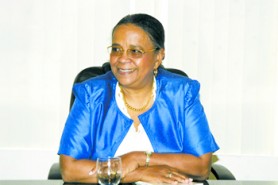PORT-AU-PRINCE, (Reuters) – Hundreds of protesters demanding the annulment of Haiti’s elections marched in the capital for the second time in days today, clashing with riot police and stoking tensions ahead of results expected on Tuesday.
The Western Hemisphere’s poorest state, which was devastated by a January earthquake and is battling a deadly cholera epidemic that kills dozens each day, is on edge a week after holding presidential and legislative polls.
The international community had hoped the Nov. 28 vote would deliver a stable, legitimate government, but that goal looks threatened following voting problems on the day of the ballot, widespread fraud allegations and simmering unrest.
At the end of today’s march by more than 1,500 protesters in Port-au-Prince, Haitian riot police fired tear gas to disperse them when they tried to break through a barrier blocking access to the area in front of the white presidential palace, which was badly wrecked in the Jan. 12 earthquake.
Demonstrators and bystanders scattered as stinging gas clouds wafted through the tent and tarpaulin shelters of a large crowded camp of thousands of homeless earthquake survivors located in front of the crumbling palace.
Provisional results from the Nov. 28 vote are due to be announced on Tuesday. United Nations peacekeepers in Haiti are bracing for possible trouble after the polls took place amid confusion and with a cholera epidemic raging in the country.
The presidential contest featuring 18 candidates is widely expected to go to a deciding run-off, probably on Jan. 16. U.N. troops and police stayed mostly out of sight during Sunday’s march although some protesters at one point chased and stoned a U.N. vehicle, which raced away.
The marchers also came under attack from counter-protesters who threw stones.
The demonstration, following a similar protest on Thursday, was led by several members of a group of around a dozen presidential candidates — excluding the main frontrunners — who have repudiated the elections, alleging “massive fraud”.
“ELECTORAL MASQUERADE”
While acknowledging problems and irregularities, the United Nations and international observers have cautiously endorsed the vote as acceptable and urged outgoing President Rene Preval’s government and its opponents to respect the outcome.
The protesters on Sunday yelled “Arrest Preval”. They accused the president, his protege presidential candidate Jude Celestin, and electoral authorities they say are controlled by Preval, of trying to steal the Haitian elections.
“He (Preval) blocked the election and we will block the country if it continues,” Satelia Saint-Louis, a 37-year-old protester, told Reuters.
Government technocrat Celestin and two prominent anti-Preval candidates, opposition matriarch and former First Lady Mirlande Manigat and popular musician Michel “Sweet Micky” Martelly, are seen as the leading contenders in the race. Two of them could go through to the deciding run-off.
Jean-Henry Ceant, one of the presidential contenders repudiating the election process, condemned what he called the “electoral masquerade” and said the protests would continue “as long as necessary” until the process was annulled.
Manigat and Martelly had originally joined other candidates in denouncing fraud and calling for an annulment. But after 24 hours of intense pressure from U.N. officials and other foreign diplomats, they backed down and said they wanted the vote to be counted, saying they expected to be the election leaders.
U.N. Secretary-General Ban Ki-moon has urged the election candidates and their supporters to respect the law and shun violence, warning that unrest will only hinder the ongoing fight against the unchecked cholera epidemic which has killed at least 2,000 people.
Analysts say it is far from clear whether the elections can deliver the stability Haiti urgently needs.
“No matter who goes to the second round, Haiti’s political leaders, the United Nations, the OAS (Organization of American States) and donors need to immediately forge a national consensus to move past this election, accelerate earthquake recovery and contain the cholera epidemic,” Mark Schneider of the International Crisis Group, wrote in a recent commentary published in Canada’s The Globe and Mail newspaper.




